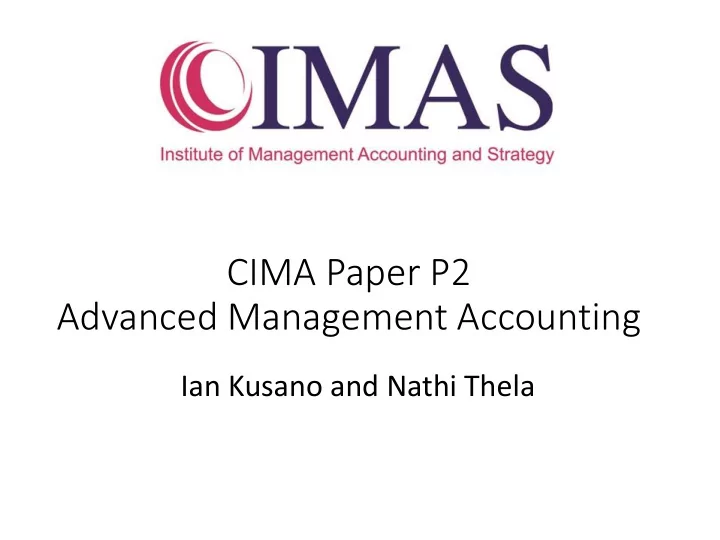

CIMA Paper P2 Advanced Management Accounting Ian Kusano and Nathi Thela
12 Chapter Uncertainty and risk in decision making 1
Uncertainty and Risk Investment appraisal faces the following problems: • all decisions are based on forecasts • all forecasts are subject to uncertainty • this uncertainty needs to be reflected in the financial evaluation. The decision maker must distinguish between: risk – quantifiable – possible outcomes have associated probabilities, thus allowing the use of mathematical techniques uncertainty – unquantifiable – outcomes cannot be mathematically modelled. 2
Uncertainty and risk Several Possible Outcomes Risk Uncertainty • Past experience • No experience – Probabilities – No probabilities 3
Expected Values Probability of the outcome occurring Sum of Future outcome EV = ∑px Long run weighted average 4
Expected Value Example 1 An organisation is considering launching a new product. It will do so if the expected value of the total revenue is in excess of $1,000. It is decided to set the selling price at $10. After some investigation a number of probabilities for different levels of sales revenue are predicted; these are shown in the following table: Units sold Revenue ($) Probability Pay-off ($) 80 800 0.15 120 100 1,000 0.50 500 120 1,200 0.35 420 1.0 EV = 1,040 In preparing forecasts and making decisions management may proceed on the assumption that it can expect sales revenue of $1,040 if it sets a selling price of $10 per unit. The actual outcome of adopting this selling price may be sales revenue that is higher or lower than $1,040. And $1,040 is not even the most likely outcome; the most likely outcome is $1,000, since this has the highest probability. 5
Expected Value Example 2 A company has identified four possible outcomes from a new marketing strategy as follows: Outcome Profits ($) Probabilities A 100,000 0.10 B 70,000 0.40 C 50,000 0.30 D -20,000 0.20 1.00 Calculate the expected outcome of this strategy. 6
Expected Value – November 2013 7
Expected Value – November 2013 8
Decision Making Criteria and Risk Attitudes Maximin Expected Value Maximax • Worst • Weighted • Best possible average possible outcome profit outcome • Choose • Choose the • Choose the best of highest the best of the worst expected value the best Risk Seeker Risk Averse Risk Neutral 9
Perfect and Imperfect Information Perfect Information Imperfect Information • Usually correct • Always 100% accurate Both have a value! Value of information = expected profit WITH information – expected profit WITHOUT information Illustration 7. 10
Perfect Information September 2013 Exam 11
Decision Trees and Multi-Stage Decision Problems 1. Draw tree from left to right, showing decision and outcomes: - Label tree - Show cash inflows/outflows - Probabilities 2. Evaluate tree from right to left: Outcome point – calculate EV - Decision point – choose best option - 3. Recommend a course of action 12
Recommend
More recommend